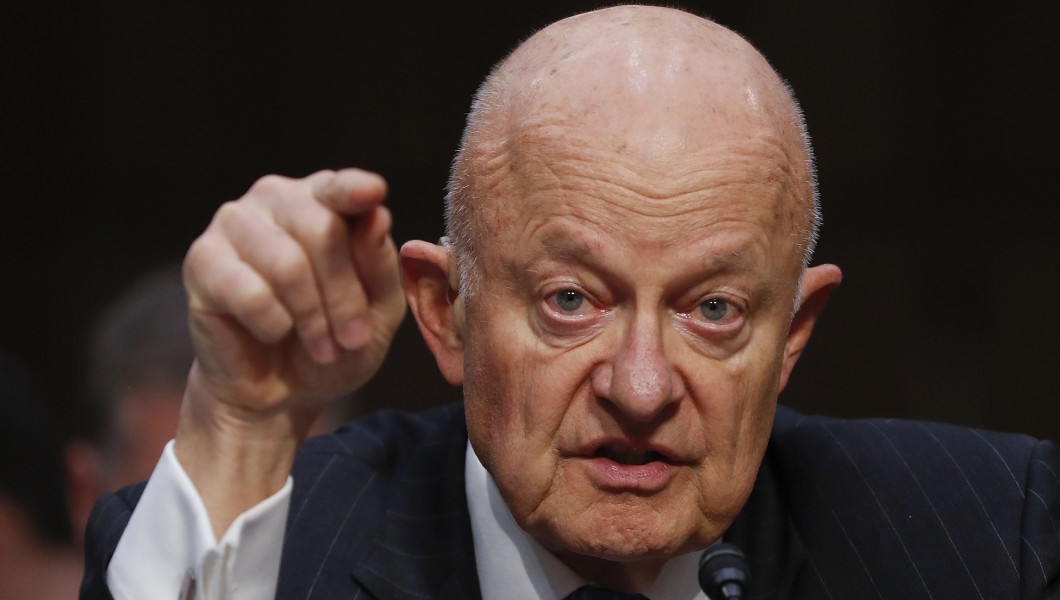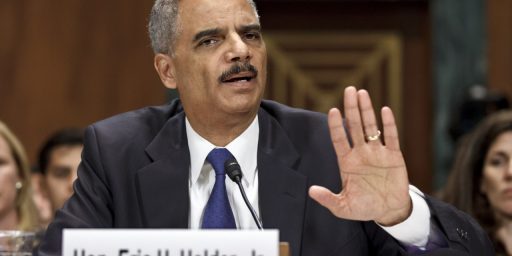James Clapper Not Charged with Lying to Congress
The statute of limitations has expired. But he should never have been asked the question to begin with.
Then-Director of National Intelligence James Clapper lied to Congress five years ago. The statute of limitations ran out yesterday without him being charged.
Washington Examiner (“James Clapper avoids charges for ‘clearly erroneous’ surveillance testimony“):
Former intelligence chief James Clapper is poised to avoid charges for allegedly lying to Congress following five years of apparent inaction by the Justice Department.
Clapper, director of national intelligence from 2010 to 2017, admitted giving “clearly erroneous” testimony about mass surveillance in 2013, and offered differing explanations for why.
The under-oath untruth was exposed by National Security Agency contractor Edward Snowden, who sparked national debate on surveillance policy with leaks to the press.
Two criminal statutes that cover lying to Congress have five-year statutes of limitations, establishing a Monday deadline to charge Clapper, who in retirement has emerged as a leading critic of President Trump.
Many members of Congress, mostly Republicans supportive of new limits on electronic surveillance, called for Clapper to be prosecuted as the deadline neared, saying unpunished perjury jeopardizes the ability of Congress to perform oversight.
“He admitted to lying to Congress and was unremorseful and flippant about it,” Rep. Thomas Massie, R-Ky., told the Washington Examiner. “The integrity of our federal government is at stake because his behavior sets the standard for the entire intelligence community.”
“Political consideration should not affect the Department of Justice from pursuing this matter,” Rep. James Sensenbrenner, R-Wis., said ahead of the deadline. “Complete and truthful testimony is imperative for Congress to conduct effective oversight. It is clear from the evidence and Director Clapper’s own admission that he lied.”
Justice Department spokeswoman Nicole Navas Oxman declined to comment on Clapper or how perjury cases typically would be handled, saying in an email, “No comment or information to be provided.” Clapper, speaking through a spokesman, declined to comment.
Clapper’s problematic testimony occurred a few minutes before noon on March 12, 2013, when he told Sen. Ron Wyden, D-Ore., “No, sir,” and, “Not wittingly,” in response to a question about whether the NSA was collecting “any type of data at all” on millions of Americans. Wyden later said he provided the question to Clapper before the hearing and unsuccessfully asked Clapper to correct the record.
Months later, Snowden revealed in June 2013 that the U.S. intelligence community obtained secret court orders forcing phone companies to turn over millions of U.S. call records on an “ongoing, daily basis.”
Clapper offered at least two different explanations for his inaccurate testimony. In a June 2013 apology letter, Clapper wrote that he gave the “clearly erroneous” answer because he “simply didn’t think of” the call record collection. But in an MSNBC interview the same month, he saidhe chose to give the “least untruthful” answer because he was “asked a, ‘When are you going to stop beating your wife?’ kind of question, meaning not answerable necessarily by a simple yes or no.”
In a January column for USA Today (“James Clapper’s perjury, and why DC made men don’t get charged for lying to Congress“) Jonathan Turley argued:
The expiration of the statute of limitations for Clapper will have the benefit of conclusively establishing that some people in this city are above the law. In a 2007 study, author P.J. Meitl found that “[a]lmost no one is prosecuted for lying to Congress.” Indeed, he found only six people convicted of perjury or related charges in relation to Congress, going back to the 1940s.
The problem is not that the perjury statute is never enforced. Rather it is enforced against people without allies in government. Thus, Roger Clemens was prosecuted for untrue statements before Congress. He was not given the option of giving the “least untruthful” answer.
Another reason for the lack of prosecutions is that the perjury process is effectively rigged to protect officials accused of perjury or contempt before Congress. When an official like Clapper or Nielsen is accused of lying to Congress, Congress first has to refer a case to federal prosecutors and then the administration makes the decision whether to prosecute its own officials for contempt or perjury. The result has almost uniformly been “declinations” to even submit such cases to a grand jury. Thus, when both Republicans and Democrats accused CIA officials of lying to Congress about the torture program implemented under former president George W. Bush, not a single indictment was issued.
For Clapper, the attempt to justify his immunity from prosecution has tied officials into knots. After Clapper lied before Congress and there was a public outcry, Clapper gave his “least untruthful answer” justification. When many continued to demand a prosecution, National Intelligence general counsel Robert Litt insisted that Clapper misunderstood the question. Still later, Litt offered a third rationalization: that Clapper merely forgot about the massive surveillance system. That’s right. Clapper forgot one of the largest surveillance (and unconstitutional) programs in the history of this country. Litt did not explain why Clapper himself said that he knowingly chose the “least untruthful answer.” Litt added, “It was perfectly clear that he had absolutely forgotten the existence of the … program … We all make mistakes.” Of course, this “mistake” was an alleged felony offense.
Clapper will establish a standard that will be hard to overcome in the future. He lied about a massive, unconstitutional surveillance program and then admitted that he made an “untruthful” statement. That would seem to satisfy the most particular prosecutor in submitting a case to a grand jury, but this is Washington.
As I argued in an August 2013 essay for The National Interest (“Clapper’s Bodyguard of Lies“) lying was likely his best option.
By its very nature, a culture of misinformation follows a culture of secrecy as night follows day. As Churchill understood, questions will come up and misinformation is necessary to divert people from stumbling on the truth.
Indeed, Wyden himself unwittingly demonstrated this recently. He was justifiably upset that Director of National Intelligence James Clapper told him that the NSA was “not wittingly” collecting data on millions of Americans when, in fact, it was and Clapper knew it. That the intelligence community defines “collect” in a different way than the dictionary doesn’t change the fact that Clapper was intentionally trying to hide the existence of the program.
Then again, Wyden should have known better than to ask that question in a public hearing. It would not only have been foolish but illegal for Clapper to acknowledge the existence of a highly sensitive and classified program in that setting. So, Clapper was put in a position where he had to either lie or give an answer that tacitly revealed classified information. (Truthfully denying one program and then giving a “I can neither confirm nor deny” response regarding another makes it rather clear that the second program exists.) Clapper tried to avoid either path by giving an answer that was too cute, seemingly denying the program existed while not quite doing so. That was foolish and he was later forced to apologize.
The bottom line here is that, while some members of Congress are entitled to know what our intelligence community is doing, “Congress” isn’t. Some information is shared only with the chairman and ranking member of the House and Senate intelligence committees. Some is shared with the committees in whole but only behind closed doors, in sessions where they’re sworn to secrecy. Very little information is shared in public hearings and, frankly, we probably shouldn’t put too much in what is.
The bottom line, then, is that Clapper had little choice but to lie to Congress given Wyden’s stupidity in asking that question in open session.







Couldn’t he have just told Wyden that his question was inappropriate or something?
Or charge him, then let him argue all of that in front of a judge.
Because this sure looks like another case where the politically connected live under a different set of laws than the rest of us.
Republicans at that time had no interest in prosecuting Clapper because they were in full support of the national security state. You know: Terrorists! We’re the good guys! Freedom! But the FBI has since moved onto the Right’s Sh!t List, so… Truth! Deep State! Government as the problem.
There’s simply no talking principle and consistency with today’s Right.
I am wondering why if he had to lie in the public hearing, he could not later privately request to amend his testimony in a closed hearing or through a classified letter or such?
James, it seems to me that your argument presupposes that the need to keep this secret is so that our enemies are not aware of it, rather than that it would be politically inconvenient for the American public to know that their government is illegally spying on them. If that is what you are arguing you should make that case.
The present administration has established new dimensions on the business of avoiding answering questions from congresspeople.
@Kit: Speaking of principles, I heard that someone was ridiculed for saying Russia was our biggest geo-political for. #MuhRussia
don’t even pretend that there are any principles or consistency on the Left.
Other than whatever gives them more power is good.
@TM01:
That would be my question too. In the past, I’ve seen other intelligence and law enforcement officials (i.e., the F.B.I. Director) say that they would need the committee to go into closed (classified) session to answer a specific question.
I understand the argument James is making here, but it seems as though that would have been a better response on Clapper’s part.
@TM01:
Maybe but that gets awkward, too, in that it makes the question seem like it was getting close to a target.
@OzarkHillbilly:
Yes, I agree and I’m surprised that I didn’t mention that in the article. I made that caveat in another piece I published around the same time about the JCS Chairman conflicting with President Obama in open testimony.
@MarkedMan:
I have no insights into what was going through Clapper’s or Obama’s mind on that score. They are not mutually exclusive.
HOLY SHIT. Quick wrap up of the last 24 hrs:
Britain: russians poisoned people on UK soil.
Media: are you standing with britain in their claim about the russians.
sanders: no
Tillerson: yeah the Russians did it.
White house: tillerson is fired.
Fück Me.
Trump isn’t colluding with the Russians; he’s their employee.
Josh Barro says Tillerson wasn’t fired for making the comment about Russia, he made the comment about Russia because he knew he was about to be fired. Even if that’s true that’s hardly much better.
@Kit: I’m old enough to remember when if you opposed any type of electronic or even domestic surveillance by the federal government, the GOP would accuse you of aiding and abetting terrorists and being personally responsible for the murder of Americans.
Now chris hayes is saying SHS is probly lying about him being fired last friday, and that it was in fact immediately after Tillerson said the Russia stuff.
SHS lying? Say it ain’t so.
In coming to his conclusion that Sen. Wyden (one of my senators) was stupid to ask that question, Dr. Joyner quotes the following from other sources: “Wyden later said he provided the question to Clapper before the hearing and unsuccessfully asked Clapper to correct the record.” Clapper knew Wyden was going to ask him that question in a public hearing and chose to lie rather than say something like “I cannot answer questions that may implicate or disclose any intelligence activity. All questions of this nature must be discussed in closed hearings.” Another quote: “He [Clapper] lied about a massive, unconstitutional surveillance program and then admitted that he made an “untruthful” statement.” Dr. Joyner’s conclusion is that we, the public should not be allowed to know this and that Sen. Wyden was at fault. Ridiculous.
@dmichael: Members of Congress don’t get to decide which Top Secret/Sensitive Compartmented Information gets released to the public. Period. I agree Clapper should have dodged this more artfully or, at very least, gone to the Committee chairman immediately afterward and amend his statement in private. But Wyden was showboating here in a reckless manner.
@Timothy Watson:
Exactly.
Americans usually go along with it. Part of it is the short-term threat of war or terror, and another part is that it’s hard to be opposed when proponents of this are waving the Red White & Blue and selling ‘patriotism’ ‘security’ and ‘loyalty.’
These days opponents of the permanent Fear Establishment are routinely branded, as you said, “of aiding and abetting terrorists.”
Perhaps Wyden’s question was improper, a point I’m unwilling to concede in that the people are entitled to know about mass data collection by the U.S. government. Nevertheless, perjuring oneself here is hardly appropriate- in fact the lying does more damage to Clapper and the institutions- he should had either equivocated, be quiet or asked for a private session- his lying is an affirmation that Congress overseeing duty is nil and that is a worse disgrace in many ways than anything else.
@James Joyner: Members of Congress don’t get to decide which Top Secret/Sensitive Compartmented Information gets released to the public. Period.
But members of the intelligence community get to commit perjury in the face of Congressional oversight whenever they decide it’s appropriate? Am I getting this right?
The U.S. government was secretly spying on millions of Americans and not in the immediate aftermath of 9/11 but over a decade later. The director of national intelligence straight out lies to Congress in order to keep that secret spying secret from Congress. And the problem is that the question was asked in the first place?
This isn’t a reason why we got Trump but it’s a reason why we deserved to get Trump.
Mike
@MBunge:
No, the problem was that the question was asked in open session. But Clapper was still wrong in what he did. As James said above, he should have gone to Wyden after the open session and tell him he needed to provide an answer in a closed session, with the relevant committee members present.
The relevant Congressional committees certainly do have the right to an answer as part of their proper oversight, and Clapper never provided one. He should have, just in the proper setting, but he didn’t.
@James Joyner: Non sequitur. Senator Wyden didn’t disclose any such information by asking a question. Your position leads t0 the conclusion that our intelligence agencies may violate the constitution and laws and force the oversight committees into silence while people like Clapper lie in public. Oversight made impotent. I suppose you will apply your standard when the appropriate Senate committee is doing its advise and consent function to the appointment Gina Haspell who ran a CIA black site in Thailand and participated in the destruction of the CIA waterboarding videos.
@dmichael: As @Mikey notes in the comment above yours, the key is venue. The Intel committee’s need information to provide oversight. Wyden was entitled to the answer in closed session. He’s not entitled to grandstand in sessions open to the public.
‘Clap on………clap on”
@James Joyner:
I’ll agree with this. Clapper could have been sentenced to prison for answering that question – or, frankly, for even acknowledging the existence of a classified program at all – in a public forum. It never should have been asked there to begin with, and Wyden well knew that when he asked it.
Frankly, Wyden should have been expelled from the committee for even asking it where he did. Wyden is a zealot on this subject, but he doesn’t get to unilaterally decide what national security policy looks like just because he can’t convince his fellow members of Congress to change the laws in that regard.
@MBunge:
Given the choice between committing perjury and violating the Espionage Act (and having your security clearance revoked), it’s a no brainer …
The program in question was neither illegal nor unconstitutional. That having been said, Wyden already knew that the program existed, and had for some time. That little stunt he pulled wasn’t about trying to get information; it was about trying to force a public revelation of its existence.
Short version? Wyden knew the program existed, and believed that the public should know as well. He decided to attempt an end run around national security policy – and force the public acknowledgement of the program’s existence – by trying to put Clapper into the position of being faced with perjury or violating espionage laws. Clapper wisely called his bluff.
Yes. Very much so. Ron f’king Wyden doesn’t get to decide, based on his own judgment, which classified information is released to the public. As I said above, at a minimum he should have been expelled from the committee for even trying this stunt of his.
@Doug Mataconis:
Not really. Making such a statement serves as a public confirmation of the existence of something related to the question which is classified and can’t be publicly discussed.
Consider the exact text of Wyden’s question:
Requesting a closed session in response is a de facto admission of “Yes, we do, but we can’t talk about that here in public.” There is no way – none – to avoid violating espionage statutes in answering that question other than to lie. Wyden never should have asked it, or absolute worst case, Wyden should have called for a closed session before asking it.
That, of course, wouldn’t have been useful to him with regard to what he was trying to accomplish. He wanted the public to know, and tried to make that happen by attempting to force the public revelation of classified information. The only sad part of this entire debacle is that Wyden can’t be prosecuted for what he did. Frankly, he belongs in prison over this stunt of his.
People need to understand that the classification nexus of a TS/SCI program does not begin and end with the operational content of the program; it also includes the existence of the program. Clapper would have been just as guilty of violating several sections of Title 18 for publicly answering any way other than as he did as he would have been for publicly laying out the details of how the program worked.